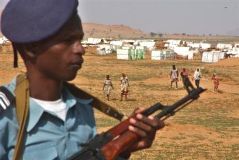U.N. begins three-day mission to assess security in Sudan’s Darfur
By ED JOHNSON, Associated Press Writer
AL-FASHER, Sudan, Aug 26, 2004 (AP) — The United Nations begins a three-day fact-finding mission in troubled Darfur on Thursday to establish whether the Sudanese government has fulfilled its pledges to improve security and rein in Arab militia accused of months of atrocities.
 Three U.N. teams, accompanied by Sudanese government officials, will fan out across the western region, before presenting their assessment to U.N. Secretary General Kofi Annan on Aug. 31.
Three U.N. teams, accompanied by Sudanese government officials, will fan out across the western region, before presenting their assessment to U.N. Secretary General Kofi Annan on Aug. 31.
The U.N. Security Council has threatened Khartoum with penalties if it doesn’t make sufficient progress in disarming Arab militiamen, known as Janjaweed, accused of killing and maiming black African farmers and burning villages across Darfur.
“We are coming very close to the moment of assessment. The clock is ticking,” said U.N. special representative Jan Pronk at a news conference in the Sudanese capital Wednesday.
“The responsibility is for the authorities in Khartoum not only to make promises but to implement the promises, and to show that it does make sense to continue on this road. If not, the international community has to consider what is necessary,” he said.
The United Nations says Darfur has become the scene of the world’s worst humanitarian crisis since African rebels rose against the government in February 2003, claiming discrimination in the distribution of scarce resources.
International rights groups have accused the government of arming the Janjaweed to crush the revolt an accusation it denies, although last week it acknowledged it has “control” over some fighters.
On Aug. 10, the Sudanese government and the U.N. signed an action plan to create safe havens in Darfur within 30 days so civilians can search for food and water and farm without fear of attack.
The plan requires the cessation of all military operations by government forces, militias, and rebel groups in areas around camps where thousands of displaced people have taken refuge, as well as near towns and villages that still have large populations.
“The visits aim to check the implementation of these commitments,” Radhia Achouri, spokesperson for the U.N. Mission in Sudan, told The Associated Press.
“The most crucial part of this is to demonstrate an irreversible, substantial and sustainable improvement of security in the areas selected by the government of Sudan,” she said.
She said the Security Council was scheduled to meet to consider Pronk’s report on Sept. 2.
Pronk, accompanied by Sudanese Foreign Minister Mustafa Osman Ismail, will head the team in Geneina, West Darfur. U.N. deputy humanitarian coordinator Erick De Mul will visit Al-Fasher, the provincial capital of North Darfur, while deputy special representative Manuel Aranda Da Silva will visit the south.
All three plan to check on conditions and humanitarian access to some of the 147 camps for displaced people. The United Nations says about 1.4 million people have been driven from their homes and are now in some 147 camps throughout Darfur’s three states, while another 180,000 Darfur refugees have fled into neighboring Chad.
On Wednesday, a South African relief organization and a Malawian food processing company sent a plane full of tents, blankets, medicine, water purification tablets and food to Darfur on Wednesday.
Malawi’s Trade Minister Eunice Kazembe was at Lilongwe International Airport to see off the cargo plane organized by South Africa’s Gift of the Givers Foundation and Malawi’s Rab Processors.
“This shows Africans are capable of assisting each other,” she said. “We should not look up to the West.”
At African Union-brokered peace talks in Abuja, Nigeria, a government delegate on Wednesday modified Sudan’s previous rejection of an international peacekeeping force for Darfur. He said the government had no objections to an African Union force used solely to usher rebels off the battlefield and into their barracks.
The African Union now has 80 observers in Darfur, protected by 150 Rwandan soldiers, to monitor a rarely observed cease-fire. It has proposed sending nearly 2,000 peacekeepers.
